History of Mercantile Rowing Club
Table of Contents
Chapters
- The River Yarra
- Early Rowing in Victoria
- The Beginnings (1880-1890)
- Mercantile in the Nineties (1890-1900)
- Sloan, Ivens and Fluctuating Fortunes (1900-1910)
- Dark Days and New Dawn (1910-1920)
- Years of Mixed Success (1920-1930)
- Through the Thirties (1930-1939)
- The Struggle for Survival (1939-1946)
- Building for Success (1946-1950)
- Mercantile to the Melbourne Olympics (1950-1956)
- Rowing to Rome (1956-1960)
- A Pink Cloud on the Horizon (1960-1965)
- The Storm and its Passing (1965-1966)
- A Clear Light Blue Sky (1966-1968)
- High Noon (1968-1970)
- A New Challenge (1970-1973)
- Fire and the Second Building Project (1973)
- Winds of Change (1973-1976)
- The Close of the Century (1976-1980)
- The Base for Success (1980-1984)
- Success (1984-1988)
- Oarsome Foursome (1988-1992)
- A Boathouse for the Best (1992-1996)
- The Rise of the Professional Coach (1996-2000)
- Golden Girls (2000-2005)
Appendices
8. Through the Thirties (1930-1939)
In the 1931-32 season, George Horder took over the role of captain, with Frank Raven becoming vice-captain and Ron Bolton secretary. As the season opened Max Bailey assumed the position of stroke of the Mercantile Senior Eight, temporarily replacing his brother Jack. This crew was defeated at both Melbourne and Henley Regattas, as were the club's other 15 entries at both of these regattas.
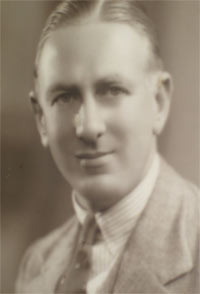
A P Miller Captain 1931-32 & 1933-34
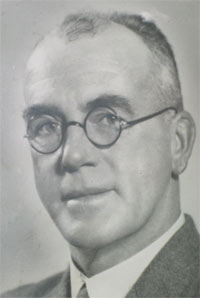
G J Horder Captain 1932-33
It was not until the Nagambie and Colac Christmas Regattas that Mercantile achieved its first success for the year with a win in the Senior Fours at the former and the Maiden Pairs at the latter. It is interesting to note that this win was the first success of S. C. (Bill) Macrae, who was the first of three brothers to row for Mercantile. Bill Macrae was secretary of the club for a number of years during the 1930's and his annual reports of those years became a precedent for the latter day secretaries of the club. Unfortunately, Bill Macrae became the club's first casualty of the Second World War. The two other Macrae brothers also rendered great service to Mercantile. Donald Macrae who rowed for the club again after distinguished war service was later ordained as a minister of the Presbyterian church of which he subsequently became Moderator.
There was little joy in the club's regatta results for the rest of the season, with the only other victories being in the Maiden Eights at Footscray, the Senior Pairs at Barwon and the Senior Eights at Ballarat. By this latter victory Mercantile won the Taylor Cup outright with Jack South and Ron Bolton having been rowed in all three winning eights.
With the exception of the Champion Pairs and Sculls, the club was represented but unsuccessful in all State Championships. Of particular interest was the Champion Open Lightweight Eights, this event having been inaugurated during the previous season and thus giving the growing ranks of lightweight oarsmen the status of their own Championship. For 1932-33, the Mercantile crew was stroked by Norm Cairnes, who, after four years of racing was still managing to keep his weight below the magical 10 stone limit.
With a disappointing regatta season Mercantile finished third to Richmond in the Senior Premiership and well down the list in the Junior Division, which was won by Essendon.
Jack South was once more the club's only representative in the Victorian Interstate Eights, again rowing five behind Alex McLeish as stroke. This time Victoria could finish only third, with the King's Cup being won by New South Wales from Queensland. Jack South retired from competitive rowing following this event.
At the end of the 1932-33 season, Sir Stephen Morell announced that he wished to retire as the club's president, an office he had held with great distinction since 1905. Sir Stephen had joined the club in 1891 when it was a small band of determined optimists and he was associated with all of its subsequent struggles, defeats and triumphs during the course of its growth to maturity. As an oarsman he had the proud distinction of rowing in the first Mercantile crew to win the Victorian Eight-Oared Championships. Despite his business and civic responsibilities, he was almost a daily visitor to the club and kept in touch with all of its activities when he was interstate or overseas. Sir Stephen continued to maintain his great interest in the club and rowing. At the time of his death in July, 1944, he was president of the Victorian Rowing Association.
The nomination of Arch Dobbie as the fourth president of Mercantile, in succession to Sir Stephen Morell, was unanimously endorsed by all members of the club.
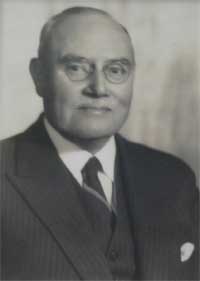
Sir Stephen Morell President 1905-33
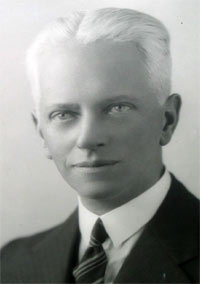
Arch Dobbie President 1933-55
There was also a change of captain as the 1933-34 season started, with "Streak" Miller again assuming this position in place of George Horder. Jack South was appointed vice-captain but resigned in December of 1933 to be replaced by Alan Gibbs.
A number of changes had taken place in the club's Senior Eight for the opening regattas, with the crew being stroked by Tom Luxton and coached by Wally Ricketts. Other changes from the previous years crew were the inclusion of Roy Thursfield, Alan Gibbs, Peter Radich and Fred Shore. This new combination had immediate success at the Melbourne Regatta, but at Henley was disqualifed after winning its heat when the coxswain weighed in two pounds light.
With no success at the Christmas Regattas, defeat by Nagambie in the Champion Fours held in January, 1934, and the club's five entries all being beaten at Upper Yarra and Footscray Regattas, it was not until the Barwon Regatta at the end of February that Mercantile recorded its second win of the season, when the Senior Eight again was successful. Unfortunately, it was unable to repeat this victory at Ballarat or in the Champion Eights which was won by Nagambie.
With the abandonment of the Easter Regattas at Bairnsdale and Sale, Mercantile therefore recorded only two senior wins for the season, but with 16 points were able to finish second to Nagambie for this Premiership. For the first time for many years, no points were recorded in the Junior Division, a fact which did not augur well for the future of the club.
Mercantile were not represented in the Victorian Interstate Eight, the crew being based on the winning Nagambie Champion Eight. The King's Cup was won by New South Wales, with Victoria swamping and failing to finish the course. New South Wales completed the double, when Herb Turner won the President's Cup for the third successive year.
After the club's poor showing of the previous year, a more positive attitude was adopted for the 1934-35 season, with a series of lectures being arranged to improve the standard of rowing. These included talks by Arch Dobbie on the "A.B.C. of Rowing" and a lecture by Dr. Clive Disher, stroke of the 1919 A.I.F. crew which had originally won the King's Cup, on "Training out of the Boat". As a result of the latter, selected crews had to prove their fitness by gymnasium programmes, brisk walks to the St. Kilda Junction and by running several laps around Como Park.
It was during this period that a lack of discipline became apparent in the club, with this no doubt contributing to the club's poor regatta performances. The executive of the day took strong steps to remedy the situation, with the result that several members were brought before the committee for disciplinary action. The minutes of those committee meetings and correspondence of the period make interesting reading and it is perhaps worth recounting some of these incidents with the hope that any action for libel by the principals involved will be statute barred as a result of the effluxion of time.
During this period Wally Turnbull was called before the committee to answer a charge of damaging the club house while attempting to gain unauthorised entry and for unseeming behaviour in a neighbouring club.
Wally Turnbull stated that he had no recollection of damaging the club house "but that if the information came from a reliable source, he was prepared to apologise and make good the damage". He also advised that the second incident reported had been merely a friendly argument and suggested that the injuries to the unfortunate member of the other club, who had suffered a black eye and abrasions, had been the result of a fall. Despite the acceptance of Wally's apology by the committee, he was not allowed the facilities of the South-West Corner for three months and warned that a repetition of his conduct would lead to his expulsion.
In another incident, two members were severely reprimanded for their unseeming behaviour at the Rutherglen Regatta, where having imbibed too freely at one of the local vineyards, they then competed in their race. For some unaccountable reason the crew could not get its timing together and their four slowly weaved its way towards the finish, just beating home the first crew in the next race. The members concerned of course, were not the first or last members of Mercantile to suffer an unexpected defeat at Rutherglen for similar reasons and it is possible that the pleasant surroundings of this New Year's Day regatta and the excellence of the local product may similarly effect Mercantilians of future years.
The year 1934 was an auspicious one for Victorian Rowing, in that it was the Centenary Year of the City of Melbourne. This resulted in a series of celebrations during October and November, with the City of Melbourne being spruced up for the occasion. Major buildings were cleaned down, the City area was decorated and even the domes on Flinders Street Station were restored to their original burnished copper.
Many sporting events were incorporated in the celebrations and amongst these was the Henley Regatta. An approach was made to the English and New Zealand rowing authorities to enter crews for the Grand Challenge Cup, with this resulting in the now famous visit by the London Rowing Club eight and an entry from the New Zealand club of Wanganui. Local and interstate crews included the N.S.W. Police, Derwent (Tasmania), Melbourne and Sydrfey Universities, Nagambie, Footscray City, Mercantile, Hawthorn, Richmond and Essendon. The London crew spent some six weeks in Melbourne before rowing at Henley and in the Victorian Eight-Oared Championship. In more ways than one, the visit of this crew provided a much needed stimulus to rowing with its dedication in training, both in and out of the boat, powerful leg drive and expert boat control. It was perhaps unfortunate that a number of Victorian coaches attempted to copy the so called "London style" with disastrous results - crews shooting their slides, uncontrolled body work and blades waving in the air.
The Mercantile Senior Eight for Melbourne and Henley Regattas was stroked by Tom Luxton and coached by Wally Ricketts on whose subsequent coaching technique the "London style" had a profound effect. The crew was an exceptionally heavy one and was supplied with a new boat with a broader beam than usual. A substantial part of the cost of this craft was met by generous donations from past and present members. Unfortunately, this boat proved difficult to handle and had little pace. The crew was successful in its heat but was defeated by the London crew in the semi-final. London went on to win the final of the Grand Challenge Cup with comparative ease. This victory was repeated a week later, when London won the Champion Eights by a very large margin from Melbourne University with Mercantile in third position. The Championship attracted a field of seven entries.
During their visit the London crew were guests of honour at the Mercantile Annual Dinner, held at the Melbourne Town Hall. This sumptuous dinner was well attended by 144 past and present members. Among those present was Horace Stevens, whose singing was much appreciated by all present.
At the Melbourne and Henley double, the Maiden Eight stroked by Bill Macrae was successful both times and at the latter regatta defeated a field of 20 crews. The club's only other win was at Melbourne Regatta, when Ted Stephenson and Keith Bilney defeated 11 crews in the Maiden Pairs.
It was fortunate that Henley of 1934 was held in November, as Melbourne's unpredictable weather in the first week in December was at its worst. It started with light rain, which continued for almost 5 days, causing streams and rivers to overflow their banks. Vast areas of roadways were inundated, particularly in the eastern suburbs. Glenferrie Road was impassable and the tennis courts at Kooyong and the ovals at Scotch College were feet under water. The boatsheds of Xavier, Hawthorn and Scotch were swept away by the fierce torrent of water. Perhaps one of the most amazing sights reported during these record floods was a dinghy moored at the front door of the Riverside Inn, this being the only means of access to this well known hostelry. Mercantile members gathered in force to protect their property as the waters of the Yarra came to within a foot of the bank at Princes Bridge. Fortunately, this was the peak of the flood and danger abated without damage to the club or equipment. A number of private motor boats were moored on the north bank and as the fast flowing water snapped their moorings, they were swept down stream, to be smashed to pieces against the pylons and carriage way of Queen's Bridge, which was itself under water.
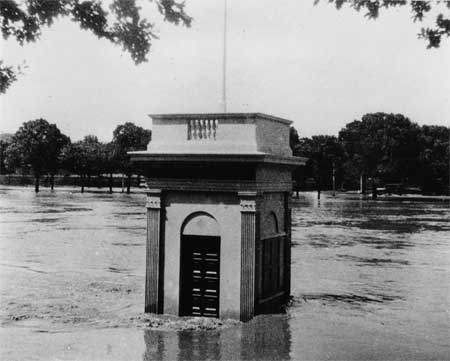
The judges box during 1934 floods
It was necessary to postpone the Footscray Regatta for a week, due to the flooded condition of the Maribyrnong River. At this regatta the club's only success was a Maiden Four, with Bill Macrae again stroke. Mercantile's two entries at Nagambie and eight crews for the Upper Yarra and Australia Day Regattas at the end of January also were unsuccessful.
With five entries for the Barwon and Ballarat double, the club was again back in the winning list, achieving victories at both regattas in the Senior Eights, Maiden Eights and Maiden Fours.
A greatly improved rowing season was climaxed at Bairnsdale and Sale Regattas, with a double in the Senior Fours and a winning Maiden Four at Sale. With 32 points, Mercantile was equal second to Nagambie in the Senior Premiership and finished in a similar position to Richmond in the Junior Division. It is interesting to note that this was Nagambie's third Senior pennant. This Club, which was established in 1901, is still the only club outside the metropolitan area or provincial cities to have won the Senior Premiership.
